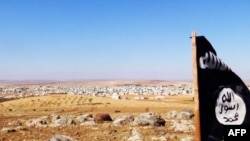The Islamic State extremist group is looking to increase revenue from taxation, smuggling antiquities “and potentially kidnap for ransom” after losing some territory and oil revenue following the destruction of significant oil facilities, the chair of the U.N. committee monitoring sanctions against the militant group and al-Qaida said Wednesday.
New Zealand's U.N. Ambassador Gerard van Bohemen told the U.N. Security Council that the Islamic State group is not short of arms or fighters.
While recent reports indicate that the flow of recruits is slowing, he said, “estimates suggest that upwards of 30,000 foreign terrorist fighters have traveled to Iraq and Syria to date.”
Van Bohemen said the threat from IS, also known as ISIL, is also expanding geographically, and as pressure increases on its territory in Iraq and Syria, foreign fighters are seeking to return home.
He said this poses a challenge because while some returning fighters are disillusioned “others return radicalized, battle-hardened and well-networked” and pose a serious risk to the international community because they can link up with local al-Qaida affiliates to conduct terror attacks.
“Their capacity to initiate complex attacks at great speed is already becoming a reality,” van Bohemen said.
“ISIL affiliates in Libya, Afghanistan and Yemen are steadily gaining a foothold and becoming increasingly important to the survival of ISIL,” he said, and as pressure grows on its territory in Iraq and Syria “it is expected ISIL will look to move funds to these affiliates, including through the use of informal money transfers.”
Van Bohemen said tracking the travel of “foreign terrorist fighters” has become more difficult because instead of traveling directly to the neighboring country of a conflict area, many “are now taking multiple, indirect routes, often using more than one passport.”
To combat this, he urged all countries to implement U.N. resolutions calling for the sharing of information to better detect and disrupt their movements.
Van Bohemen said the movement of funds and fighters outside IS-controlled territory also provides an opportunity for U.N. members to freeze assets.
He urged all countries to send the committee new names for the U.N. sanctions blacklist. All countries are required to freeze the assets and ban travel of individuals on that list.




